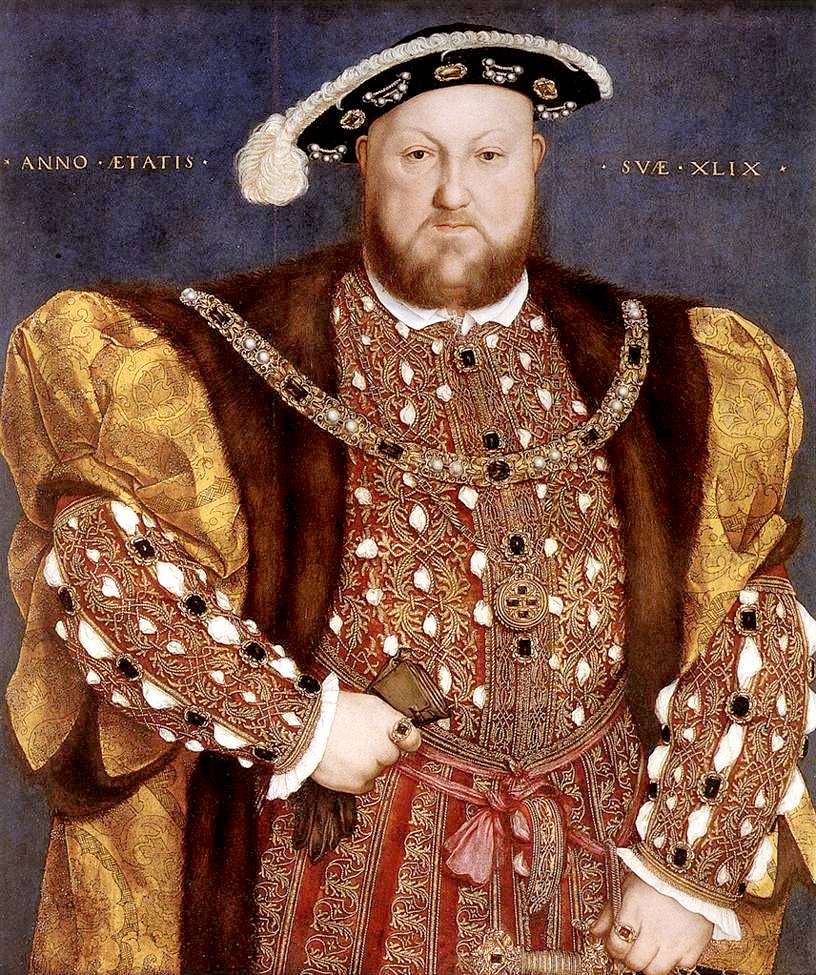
Henry VIII (28 June 1491 – 28 January 1547) was King of England from 21 April 1509 until his death. Henry was the second Tudor monarch, succeeding his father, Henry VII.
Henry is best known for his six marriages and, in particular, his efforts to have his first
marriage, to
Catherine of Aragon, annulled. His disagreement with the Pope on the question of such an annulment led Henry to initiate the English Reformation, separating the Church of England from papal authority and appointing himself the Supreme Head of the Church of England. Despite his resulting excommunication, Henry remained a believer in core Catholic theological teachings.
Domestically, Henry is known for his radical changes to the English Constitution, ushering in the theory of the divine right of kings to England. Besides asserting the sovereign's supremacy over the Church of England, he greatly expanded royal power during his reign. Charges of treason and heresy were commonly used to quash dissent, and those accused were often executed without a formal trial, by means of bills of attainder. He achieved many of his political aims through the work of his chief ministers, some of whom were banished or executed when they fell out of his favour. Thomas Wolsey, Thomas More, Thomas Cromwell, Richard Rich, and Thomas Cranmer all figured prominently in Henry's administration. He was an extravagant spender and used the proceeds from the Dissolution of the Monasteries and acts of the Reformation
Parliament to convert into royal revenue the money that was formerly paid to
Rome. Despite the influx of money from these sources, Henry was continually on the verge of financial ruin due to his personal extravagance as well as his numerous costly continental wars, particularly with Francis I of France and the Holy Roman Emperor Charles V, as he sought to enforce his claim to the Kingdom of
France. At home, he oversaw the legal union of England and Wales with the Laws in
Wales Acts 1535 and 1542 and following the Crown of
Ireland Act 1542 he was the first English monarch to rule as King of Ireland.
His contemporaries considered Henry in his prime to be an attractive, educated and accomplished king. He has been described as "one of the most charismatic rulers to sit on the English throne". He was an author and composer. As he aged, Henry became severely obese and his health suffered, contributing to his
death in 1547. He is frequently characterised in his later life as a lustful, egotistical, harsh, and insecure king. He was succeeded by his son Edward VI.
THE
SIX WIVES OF HENRY
Henry
was clearly a lothario on a grand scale caught up in his role of King of
England and not able to pursue his passions as might any person today, not
constrained by position and power and presumably unwilling to resort to brothels
for his delights. His six wives were:
Catherine
of Aragon
Anne
Boleyn
Jane
Seymour
Anne
of Cleves
Catherine
Howard
Catherine
Parr
These
are in order of betrothal. As you might have noticed, he had a thing about
woman named Catherine.
LINKS
& REFERENCE
http://www.english-heritage.org.uk/
